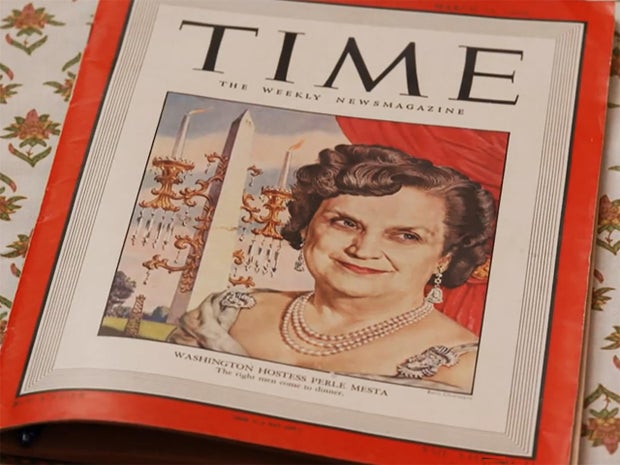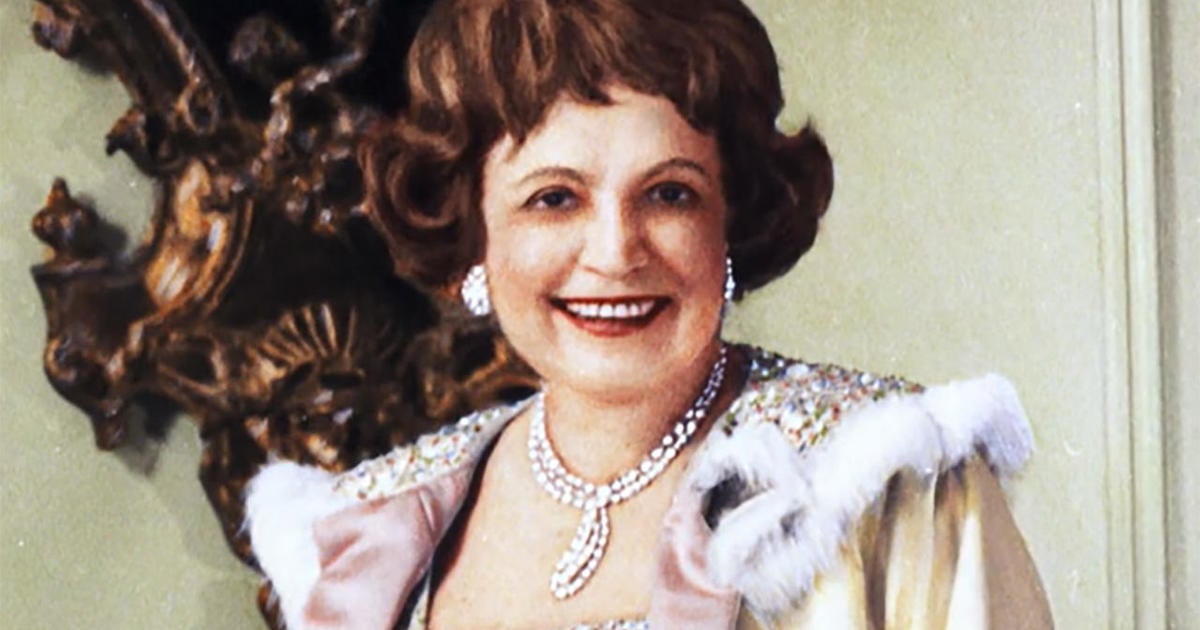Perle Mesta, the renowned social queen of Washington
In “Call Me Madam,” the 1953 movie version of Irving Berlin’s hit musical, it was no secret that Ethel Merman was channeling a real person – a wealthy widow by the name of Perle Mesta, who, in the 1940s and ’50s, was one of the best-known women in America.
“I was astonished,” said biographer Meryl Gordon. “There were four or five thousand newspaper stories about her a year.”
Astonishing, says Gordon, because Mesta was known mainly as a hostess who gave dazzling parties in the nation’s capital, mixing power brokers from both sides of the political aisle, with Hollywood and Broadway stars, and even members of the Supreme Court.
As Merman sang:
I’m the chosen party giver for the White House clientele
And they know that I deliver what it takes to make ’em jell
And in Washington I’m known by one and all
As the hostess with the mostes’ on the ball
Gordon says, in the 1940s and ’50s, Perle Mesta was “the woman who knew everyone” (the title of her new book). She said Mesta bought her way into society in Washington: “But she was also smart about it. Perle figured out how to make friends with the right people. ‘I’m having a couple senators over, maybe you’d like to join us?’
“She made herself very popular.”

CBS News
She was born Pearl Skirvan. Her father, an oil man and real estate developer, made and lost several fortunes in Oklahoma. Perle moved to Pittsburgh after marrying George Mesta, a steel magnate, and when he died in 1925, he left Perle (then in her mid-thirties) a fortune that today would be worth more than $260 million.
She spent that fortune to Washington, D.C., making herself famous, says Marie Ridder, a conservationist and retired journalist. “She was known as the social queen of Washington.”
Ridder was 20 years old when she attended her first Perle Mesta party. “She invited me to a party because she wanted press coverage,” Ridder said. “No other reason, not ’cause she thought I was charming or anything. No, it was the press badge she cared about.”
I asked, “Why did she want reporters there?”
“She wanted to be known. Come on!” laughed Ridder.
Sally Quinn, who covered events like Mesta’s as a style section reporter for the Washington Post, called her a phenomenon. “I’ve never met anybody like Perle Mesta, and I’ve never heard of anybody like her,” she said.
Quinn says Mesta instinctively knew that work in Washington wasn’t just conducted in the halls of Congress: “You sit next to somebody at dinner, you know that, if you’ve been trying to get them on the phone – if they’re at the White House, or the journalist trying to get them on the phone – [and] you can’t, the next day, you’ll be able to call and get them on the phone.”
By the late ’40s, Mesta had become as famous as many of her guests. She inspired a “Playhouse 90” production, “The Hostess with the Mostes’,” with Shirley Booth in the lead role. Mesta was even featured on the cover of Time Magazine.
The coverage, however, wasn’t always kind, describing her in ways (such as her “more than ample bulk”) that would never be used for a male. “It was surprisingly cruel, and I’m not really sure why,” said Gordon. “It was almost like people were trying to take her down a notch.”
But what made Mesta such a power in Washington was her uncanny ability to recognize political talent before others did: Harry Truman, Dwight Eisenhower and Lyndon Johnson were all early guests at her home. “She had a real nose for who was going to be powerful,” said Quinn. “She was all over them long before they were who they were.”

Simon & Schuster
In 1949, after Harry Truman was elected president, he rewarded Mesta by naming her envoy to Luxembourg. That’s how “Madame Mesta” inspired the hit musical. But the appointment didn’t go down as well at the State Department. “She was belittled; she was cut out of meetings,” said Gordon.
Mesta described the difficulties she faced on an interview program that aired on CBS at the time. Asked “Have you found being a woman a handicap in performing your ministerial duties?,” Mesta replied, “To a certain extent it’s a handicap, because we have to prove ourselves. And we have to prove that we can do a job. I think maybe we have to work just a little bit harder than the men do.”
Still, Mesta thrived in the post, continuing to give parties, including a monthly event for American GIs based in Europe. “This went on for four years,” said Gordon. “She estimated that 25,000 people, soldiers came to her parties.”
Gordon says that, only when researching her new biography, did she realize what the hostess managed to accomplish behind the scenes. Perle Mesta, a staunch feminist and believer in civil rights, broke barriers in 1949 by insisting that Truman’s inaugural balls be integrated. “She made an enormous effort to be inclusive at her parties, at parties she organized for Democrats, at a period which many people weren’t comfortable having Black folks to their homes,” Gordon said. “And she did that. And it was leading by example. She wasn’t a civil rights crusader. It’s just that these were her friends, and she wanted them to be part of her life.”
Mesta’s star began to fade during the Kennedy years. Ridder said, “I guess many people took her seriously. I think my age group didn’t.”
She died in 1975 at 92 years old. No one since, says Quinn, has taken her place. “I don’t think Washington could handle a Perle Mesta today,” she said.
Quinn doubts that, in the current environment, anyone could pull off what Mesta once did so brilliantly: getting Democrats and Republicans to sit down at a dinner table and see eye-to-eye. Are we missing out on something, not having that? “Oh, terribly,” said Quinn. “It’s just awful. It’s awful that people can’t get together and talk.”
READ AN EXCERPT: “The Woman Who Knew Everyone” by Meryl Gordon
READ AN EXCERPT: “The Party: A Guide to Adventurous Entertaining” by Sally Quinn
For more info:
- “The Woman Who Knew Everyone: The Power of Perle Mesta, Washington’s Most Famous Hostess” by Meryl Gordon (Grand Central Publishing), in Hardcover, eBook and Audio formats, available via Amazon, Barnes & Noble and Bookshop.org
- “The Party: A Guide to Adventurous Entertaining” by Sally Quinn (Simoon & Schuster), in Trade Paperback format, available via Amazon, Barnes & Noble and Bookshop.org
- Marie Ridder, Piedmont Environmental Council
Story produced by Jay Kernis. Editor: Remington Korper.










